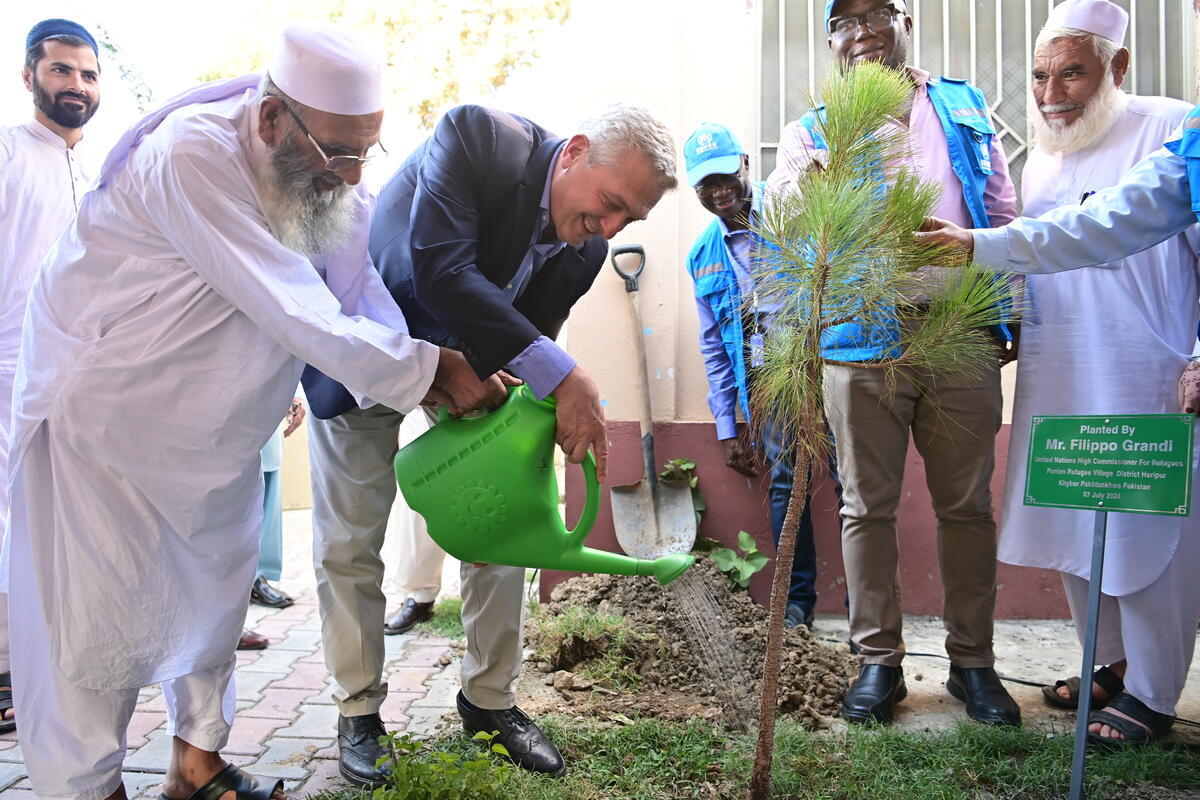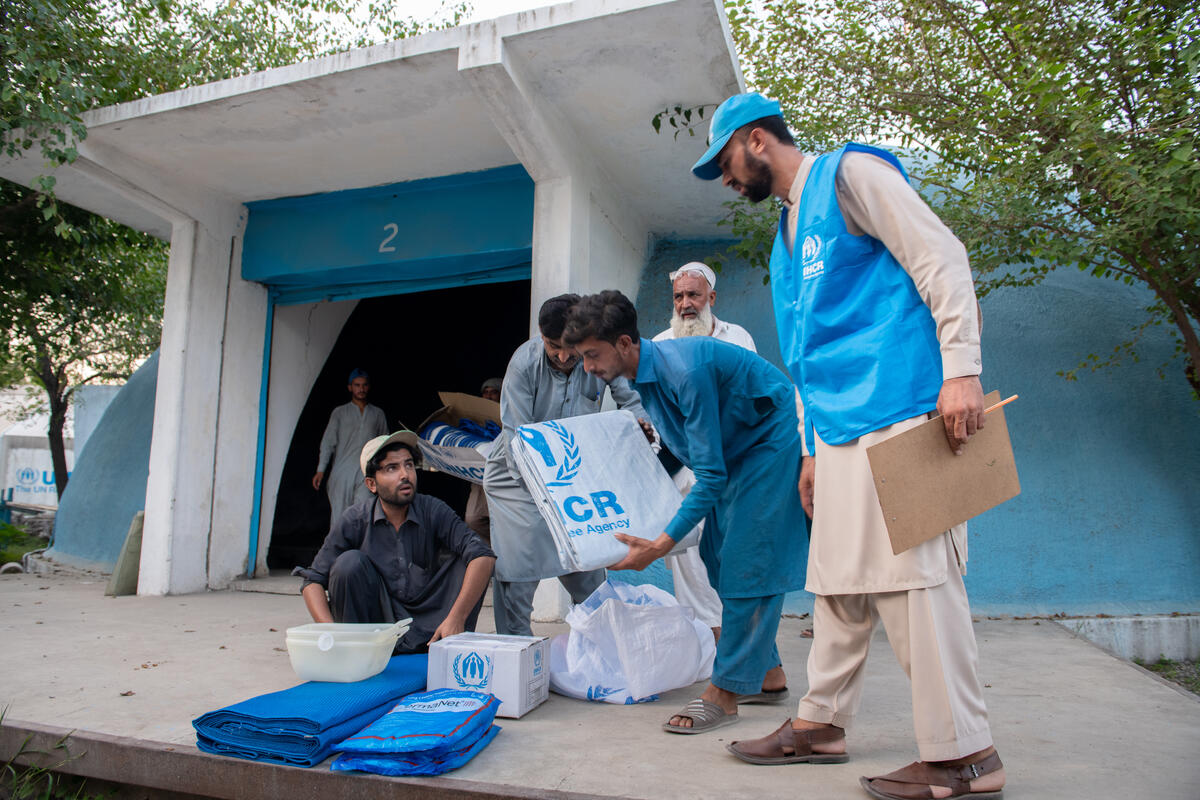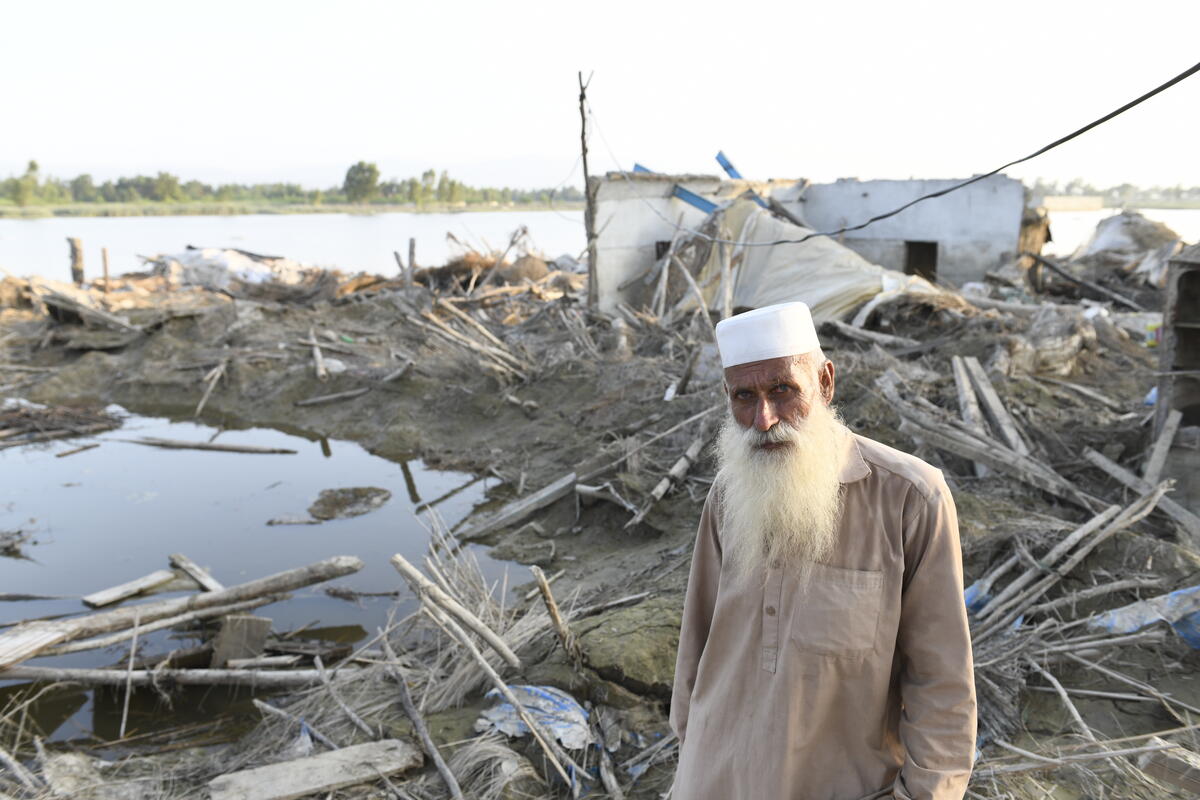Hundreds of thousands displaced by fighting in Pakistan highlands
Hundreds of thousands displaced by fighting in Pakistan highlands

MARDAN DISTRICT, Pakistan, May 8 (UNHCR) - The UN refugee agency said Friday there was a situation of "massive displacement" in north-west Pakistan, as the confrontation between government forces and militants becomes more widespread and people take advantage of the partial lifting of curfews to move into safer areas.
The provincial government estimates between 150,000 to 200,000 people have arrived in safer areas of North West Frontier Province (NWFP) over the last few days, with another 300,000 on the move or about to move.
Those fleeing the latest escalation of hostilities in Lower Dir, Buner and Swat districts join another 555,000 previously displaced Pakistanis who had fled their homes in the tribal areas and NWFP since August 2008 and who had already been registered by NWFP authorities and UNHCR. The vast majority of the earlier arrivals - more than 462,000 people - are staying in rental accommodation or with host families. Another 93,000 are staying in 11 camps supported by UNHCR, other UN humanitarian agencies, non-governmental organizations and the Red Cross and Red Crescent family.
"The new arrivals are going to place huge additional pressure on resources," UNHCR spokesman Ron Redmond said in Geneva. To date, more than 83,000 people from Buner, Dir, and Swat have been registered from the new influx: some 5,000 staying in three new camps and more than 78,000 people who are renting houses or staying with host families.
However, registration in the new camps is continuing and the figures will rise quickly. There are also reports of people from Buner arriving at the existing camps in Lower Dir. In Islamabad, Rawalpindi, Lahore and other urban centres of the Punjab, UNHCR has registered a further 40,000 displaced people, mainly from Bajaur, Mohmand and Swat, over the past two weeks.
UNHCR field teams report the roads out of Swat and Buner, as they converge in the districts of Mardan and Swabi, are full of traffic. A journey to Mardan, which normally takes two hours, now can take twice that long because the road is jammed.
The Jalala camp in Mardan district is one of the three camps established six days ago in response to the influx of people fleeing fighting in Buner and Lower Dir. In the last two days, an increasing number of families from Swat have gone to the camp, travelling in rickshaws, cars, small trucks and buses. Most carry little more than the clothes on their backs.
New arrivals told UNHCR staff in the camp yesterday that they had trouble finding transport and had to pay steep prices to hire vehicles. One family of 20 from Buner reported paying 30,000 rupees ($350) to travel to the camp from their home. Another man from Mingora, capital of Swat, drove with his family in a rickshaw for seven hours to reach the safety of Jalala camp.
Mohammad, aged 16, was at school in his Swat Valley village when the government warned people to leave. He arrived in Jalala on Thursday carrying his school books because he did not want to fall behind in his studies. "We came to this place because it is a safe place. We had nowhere else to go. My father is a cabbage farmer. We do not have a lot of resources or savings and we had no choice but to come here," he told UNHCR.
The teenager said he had seen lots of people on the road and scrambling to get lifts on vehicles. "For the first time in my life, I saw women hanging off the sides of vehicles," he said, adding: "People are desperate to flee and find transport." He managed to hitch a series of lifts.
Amandullah, from Buner district, took four days to reach Jalala by vehicle because he and family members could not travel during curfew hours. "My family was separated on the journey and I hope my father will arrive soon." said the worried 22-year-old.
Meanwhile, a doctor working for the provincial government in Jalala said people were arriving with respiratory problems, scabies, insomnia and trauma. "People have left behind animals and poultry and, in some cases, even family members. They have had to flee their homes suddenly. Many of the children don't even have shoes."
Aside from Jalala, UNHCR has also helped set up Sheikh Shehzad camp in Mardan and Yar Hussain camp in Swabi district. "We are helping the Pakistan Red Crescent set up a fourth camp in Swabi. UNHCR site planners are currently assessing the suitability of land for additional camps in the region already identified by the government," Redmond said in Geneva.
Meanwhile, further south in NWFP, plans are under way to further expand the existing Jalozai camp, currently hosting some 48,000 people who have fled the tribal areas since August last year.
Over the past week, UNHCR has worked with the government to set up 12 registration centres in Mardan, Swabi and Charsadda districts. However, this is not enough and the agency has plans to open 75 registration centres in the region and to expand the number of humanitarian hubs aimed at helping people staying outside of camps.
On Thursday, a new reception centre opened on the main Malakand Road at Jalala to give people food, water and information about the camps and registration centres. It is the first of four such centres planned on the major routes of influx to assist people in the safer areas. Plans are also under way to provide medical care and transport assistance at the reception centres.
UNHCR is currently responding to the emergency with relief supplies (tents, plastic sheets, buckets, jerry cans, and kitchen sets) for 100,000 people, while procuring additional supplies for an additional 200,000.
By Ariane Rummery in Mardan District, Pakistan








